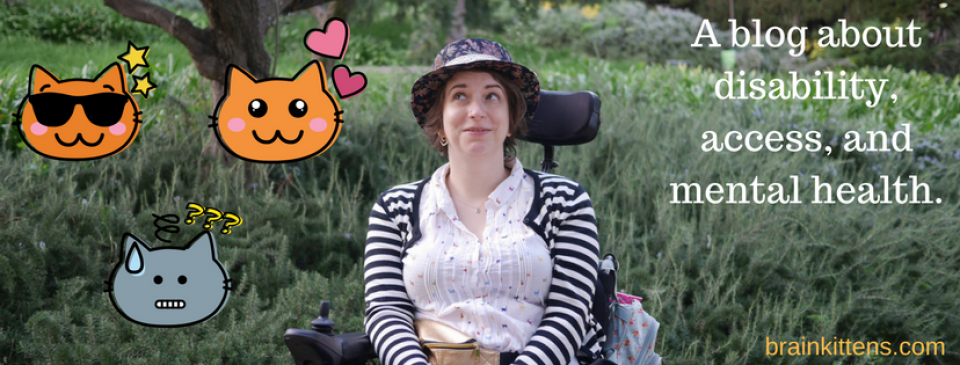Tags
We need to talk about something faced by disabled people every day: the attitudes of strangers. Not remarks, not discrimination, but the silent stares.
There’s no question that everyone gets judged on their appearance by those they pass in the streets. Something that makes you stand out will attract attention be it crutches or a strange hairstyle. I’ve been there pre-disability: bright obnoxious pink white and orange woollen dreadlocks paired with multiple facial piercings. Then I revelled in the stares (two fingers up to society? oh teenage me), but now when people look at me struggling to walk with crutches, hiding behind nothing, it feels like the stares are piercing my skin. I attract attention for the “wrong” reasons, those beyond my control, yet I feel no pride in my appearance now. There’s nothing worse than passing a chattering group of friends on the tube platform, for them to go silent, watch me pass, then start up again in hushed tones once I’m out of earshot.
On a Facebook-based support group the other day, I saw a woman ask why so many of us posting have negative or angry responses to strangers asking questions about our crutches or wheelchairs. She suggested that we should embrace the questions, and use it as a chance to educate people about a debilitating and under-diagnosed condition. This met with a mixed response from the rest of the group, and sowed the seeds of this post in my mind.
Ideally, if a stranger approached me and asked me “Excuse me, do you mind me asking why you walk with crutches?” I would give them a polite, concise but informative answer. But that is of course just hypothetical – they DON’T tend to ask that question. I get “What’s wrong with your leg/legs?”/ “What happened to you?”/ “Aren’t you too young to be disabled?”. None of these require acknowledgement, let alone dignifying them with a response (although I did once end up getting a major charity’s entire street-fundraising team retrained in their appropriate opening gambits, of which “Woah, what’s up with your legs?” is NOT one).
And if the hypothetical polite and considerate question is asked? I am probably not in any mood to answer it. And here’s why:
I call it the Triangle Of Doubt. I experience it almost every time I go out. Their eyes go first to my crutches (disabled!), then my face (young!) then my legs (not broken!) and around again, the frown becoming deeper. Something doesn’t add up there. They try to work out which bit is wrong. Too young to be disabled? Faking? Fashion accessory? Benefits cheat? Should she be out alone?
What this mostly amounts to is I get frowned at by strangers who’ve been staring at my legs. And it adds up. I end up trying to avoid eye contact.
So, usually by the time someone comes up and asks me a polite question about disability, I have had x-number of the above microaggressions and my patience has run out.
Generally I really dislike being asked about disability when I’m out in public by complete strangers who only want to satisfy their own curiosities*, but I’m happy to educate people about Ehlers-Danlos syndrome and chronic pain over the internet, but in my own time and when I’m able to, but this is the key point: you cannot demand personal information from people and expect to be given all you want then and there. Disabled people may be dealing with chronic pain, exhaustion, and the effects of strangers’ attitudes and even politely asking could be upsetting or met with a snappy response. Consider this next time you feel entitled to approach a stranger for details of their life. Although you might be lucky and get one of the small percentage who don’t pick up on the microaggressions.
And, for the record, the correct response to “What’s wrong with your legs?” is “What’s wrong with your manners?”.
*exemption given to medical professionals because EDS is really undertaught and we often have to be our own experts and teach our own doctors!

“What’s wrong with your manners” is the best response ever. The two craziest comments I’ve ever received were “Boy, you sure do walk fast for a blind girl” and “Baby, I wish you’d hit me with that stick of yours”. Sadly, I didn’t have clever responses like you do!
LikeLike
Kathleen, re walking fast I would just reply “yeah there’s a really awful smell around here I’m trying to get past it” as for hitting the stick just do or charge them £500 for the privilege 😉
I have MS and use a scooter usual reply is a blank stare or mumble something about being extremely lazy – I know a girl with EDS also, she has a seriously funky Harley motorbike scooter- it cost a bomb but it’s seriously cool💘
LikeLike
Love your answer! Will definitely be using that in the future.
My favourite is always “you are too young to use a cane/wheelchair”. I guess all those kids’ wheelchairs I see are for decoration
LikeLike
Reblogged this on markcatlin3695's Blog.
LikeLike
Pingback: Sex and disability – Eroticon 2016 | Sex blog (of sorts)